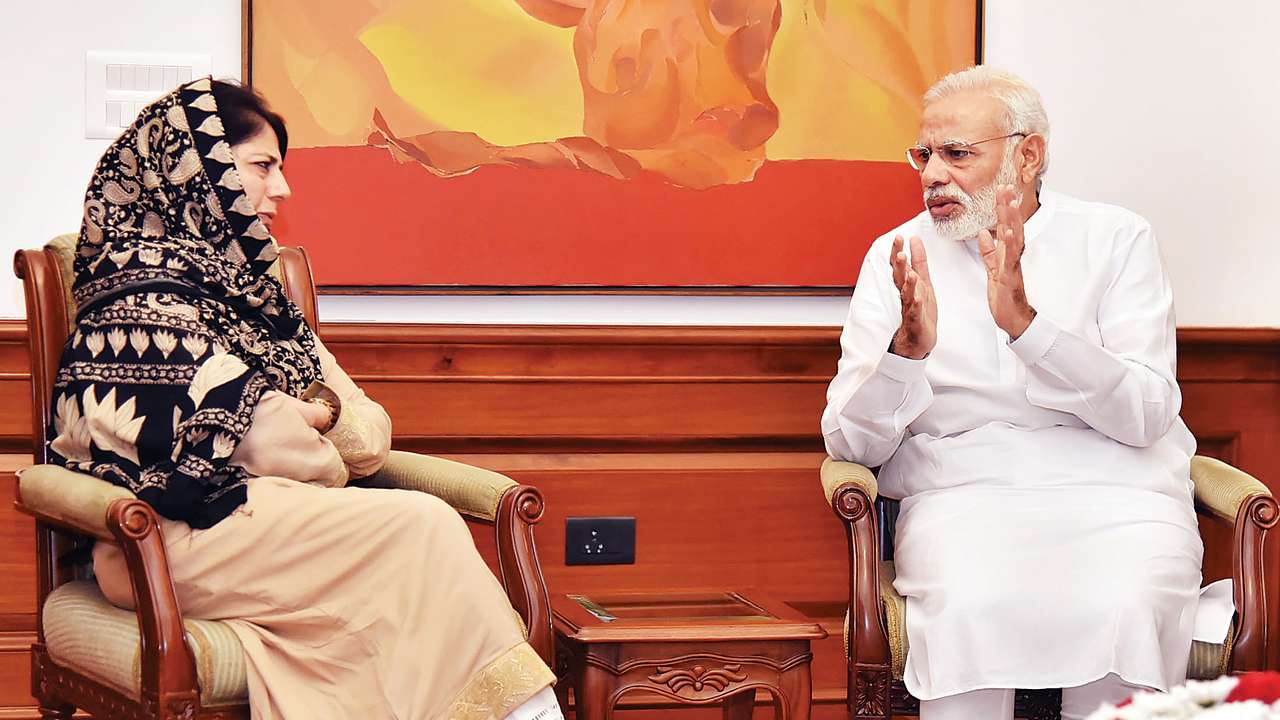
On the first day of Ramzan, following the cessation of counter-terrorism operations by Indian security forces, ordered by Jammu & Kashmir Chief Minister Mehbooba Mufti, Pakistan-sponsored terrorists killed a Kashmiri civilian, 23-year-old Hila Ahmad Parray. Days later, Pakistan Rangers opened heavy mortar fire along the Line of Control (LoC), killing four more Indian civilians and two BSF jawans. The ploy clearly was to infiltrate terrorists across the LoC, exploiting the cessation of counter-terror operations by India.
Defending the cessation, the NDA government said that while search and destroy operations would not take place during Ramzan, Indian security forces would retaliate robustly if attacked. That states the obvious: no army will take an attack on its soldiers without immediate retaliation. Several terrorists have been since killed by Indian security forces, but clearly hard-core militants from the LeT, JeM and Hizbul Mujahideen, who were on the run from the Indian army, have been given time to regroup over the next few weeks.
Why is the decision by Mehbooba to cease counter-terror operations during the month-long Ramzan period likely to prove counter-productive? Those who don’t learn from history, as Winston Churchill said, are doomed to repeat it. In 2000, former Prime Minister Atal Bihari Vajpayee ordered a similar cessation of counter-terror operations. The suspension lasted for six months, from November 2000 to May 2001, and resulted in failure. During that period, over 800 people were killed and the LeT launched a major terror attack on Srinagar airport.
The BJP’s J&K policy has been confused and inconsistent. On the one hand, it has employed a muscular strategy on the ground against Pakistan-abetted terrorism in the Valley. The Indian army, CRPF and J&K police have eliminated hundreds of terrorists, including key members of the LeT, JeM and Hizbul Mujahideen. But by suddenly applying the brakes on counter-terror operations for the Ramzan month, the Modi government has sent out mixed signals. The momentum of the army’s counter-terror thrust has been stalled. The LeT and other terrorist arms of the Pakistan army have treated the ‘ceasefire’ with contempt from the day it was announced, declaring that they would not honour it.
The underlying problem lies within the PDP-BJP alliance government. Mehbooba seeks dialogue with Pakistan and its paid separatist agents, the Hurriyat, even as Pakistan continues to spread terror in the Valley and violate the ceasefire across the LoC. The BJP says it won’t talk to Islamabad till Pakistan-sponsored terrorism stops. Between these two positions of the alliance partners, there is an unbreachable chasm.
Mehbooba granted amnesty to over 9,000 detained stone pelters. The BJP, despite being an equal partner in the J&K government, reluctantly agreed. When alliance partners have such starkly opposing views, the government will inevitably be seen as weak and vulnerable. Though stone pelting and terrorism are restricted to five or six districts of the Valley, terrorists and their agents have succeeded in giving the perception of a Valley torn asunder by the Indian army’s brutal occupation.
Foreign media, NGOs and others buy into this fraudulent narrative. The blame for that lies squarely with the BJP’s leadership in the state as well as at the Centre. The BJP’s weak-kneed ministers have been unable to assert themselves. The Centre’s interlocutor Dineshwar Sharma has tried for months to provide the healing touch to ordinary Kashmiris. He has made no headway. His appointment has even been somewhat counter-productive, showing that the BJP’s J&K ‘tough love’ strategy vacillates between blowing hot and cold. This emboldens the Pakistan army which knows from its experience of dealing with successive Indian governments that India remains a soft target.
Mehbooba has proved to be a particularly ineffective leader. Her alliance with the BJP survives only to prevent Omar Abdullah’s National Conference from returning to power if the government falls apart before its term ends in December 2020. She has thus chosen the line of least resistance: appeasing her core voter base by pardoning murderous stone pelters, placating Pakistan and the Hurriyat with the Ramzan ceasefire, and mollifying her BJP partners in Delhi by periodically briefing Prime Minister Modi and Home Minister Rajnath Singh.
The prime minister’s one-day visit to J&K last Saturday to inaugurate a slew of power and infrastructure projects underlined the potential the state possesses. And yet, the recent murder of a tourist has ruined the summer tourist season with hotels reporting occupancy rates of below 15 per cent. Speaking in the Valley last week, Modi compared himself to Vajpayee, saying he, too, was a “follower of the concept of Kashmiriyat”. Addressing stone pelters directly, Modi said: “My appeal to these misguided youths is to return to the national mainstream, which is their own family and participate in the development of Jammu & Kashmir.” The prime minister pledged Rs 25,000 crore for the development of J&K, including Rs 6,000 crore for the Kishanganga Hydel Project that will generate 330 MW of electricity, sending Pakistan scrambling to the World Bank in Washington to protest against ‘violation’ of the Indus Waters Treaty (IWT).
The Pakistani army and the terrorists it has created will receive Modi’s Vajpayee-esque embrace of Kashmiriyat with relief. For them it means business as usual — unleashing terrorism on Indian soil during Ramzan and after.
The writer is author of The New Clash of Civilizations: How The Contest Between America, China, India and Islam Will Shape Our Century. Views are personal.